INDIAN ECONOMY
India’s Gross Domestic Product (GDP) contracted 7.5% in the second quarter of 2020-21, following the record 23.9% decline recorded in the first quarter, as per estimates released by the National Statistical Office.
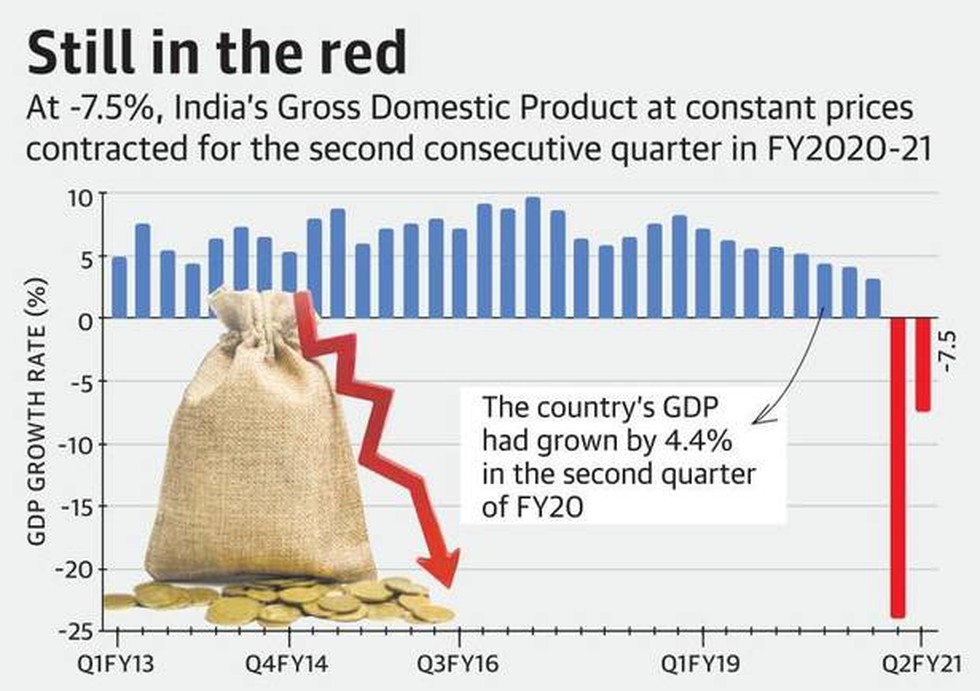
About:
- The country has now entered a technical recession with two successive quarters of negative growth.
- Agriculture, which was the only sector to record growth between April and June this year, grew at the same pace of 3.4% in the second quarter.
- Manufacturing gross value-added (GVA) staged a sharp recovery to record 0.6% growth between July and September after collapsing 39.3% in the first quarter.
- Electricity, gas, water supply and other utility services also recorded 4.4% growth in the second quarter, recovering from a 7% contraction in Q1.
- But it remained a bleak quarter for several sectors, including mining, services such as retail trade and hotels, construction and financial services.
- While the 7.5% contraction in GDP came as a positive surprise, there are concerns about a decline in government spending and the worsening fate of two key sectors compared to the first quarter.
MOTOR VEHICLE AGGREGATOR GUIDELINES 2020
The Ministry of Road Transport and Highways has issued the Motor Vehicle Aggregator Guidelines 2020 as per the requirements and provisions of the Motor Vehicles (Amendment) Act, 2019 and further as per the amended Section 93 of the Motor Vehicles Act, 1988.

The Guidelines provide for –
- License issued by the State Government is a mandatory re-requisite for permitting business operations by the aggregator.
- For regulating the aggregators, the guidelines specified by the Central Government may be followed by State Governments.
- In order to ensure compliance with the license requirements the Act stipulates penalties under Section 93 of the Act.
- These Guidelines seek to establish a regulatory framework for aggregators by State Governments to ensure that the aggregator’s are accountable and responsible for the operations executed by them.
- The business shall also be considered as a service provided by the aggregators to serve the larger public interest in terms of generation of employment, commutation facilities to the public which is cost effective and comfortable.
HELMET STANDARDS
The Ministry of Road Transport and Highways has revised the two-wheeler helmet standards in India.

About:
- Now helmets in India will come under compulsory Bureau of Indian Standards (BIS) certification and publication of Quality Control Order (QCO). According to a recent report, the new norms will see the 1.2 kg weight limit for helmets being done away with, which was implemented in 2018.
- The rule restricted the sale of imported helmets in India that did not carry the ISI mark and weighed considerably more than the weight cap under the BIS norms.
- However, the revised standard will allow the sale of imported helmets, though they will still need to comply with the Indian Standard (IS) norms.
NATIONAL ORGAN DONATION DAY
The 11th Indian Organ Donation Day was celebrated by the Union Health Ministry in New Delhi.

About:
- Every year, for the past 10 years, 27 November has been celebrated as the ‘Indian Organ Donation Day’ in the country.
- The National Organ & Tissue Transplant Organisation (NOTTO) is mandated under the Transplantation of Human Organs (Amendment) Act 2011 to carry out activities for promotion of organ donation from deceased persons.
- Tamil Nadu has been adjudged the best in organ donation in the country for the sixth consecutive year.
INDIA CLIMATE CHANGE KNOWLEDGE PORTAL
Minister of Environment, Forest and Climate Change Prakash Javadekar launched the India Climate Change Knowledge Portal.
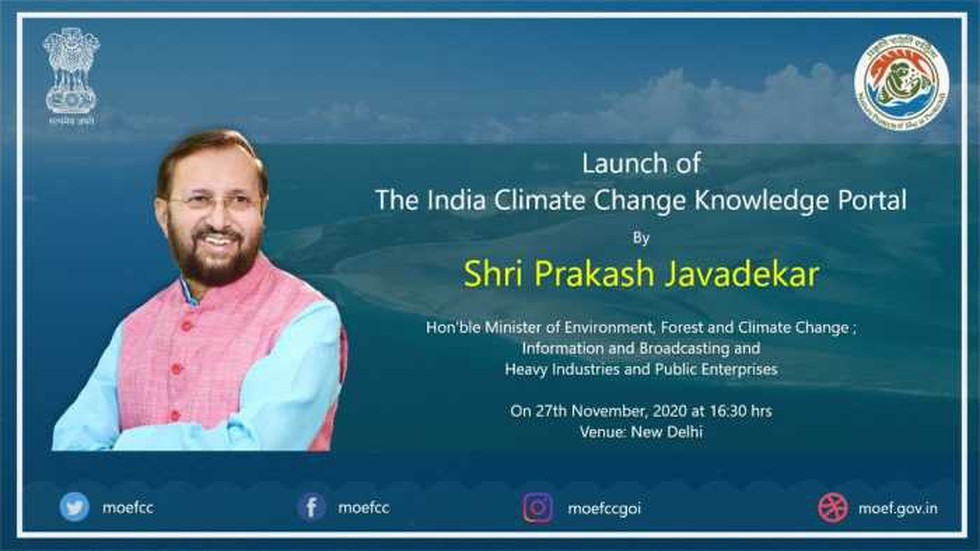
About:
- The portal will have all the major steps the Government is taking at both national and international levels to address the climate change issues.
- It will be a single-point information resource that provides information on the different climate initiatives taken by various Line Ministries enabling users to access updated status on these initiatives.
- He also said that India has practically achieved its pre-2020 climate action targets.
ATHENA SWAN
One of the focuses of the new Science, Technology and Innovation Policy, currently being drafted by the Department of Science and Technology (DST), will be to increase the participation of women in science.

About:
- To this end, the DST will incorporate a system of grading institutes depending on the enrolment of women and the advancement of the careers of women faculty and scientists.
- The concept borrows from a programme started by the UK in 2005 called the Athena SWAN (Scientific Women’s Academic Network), which is now being adopted by many countries.
- The Athena SWAN Charter is an evaluation and accreditation programme in the UK enhancing gender equity in science, technology, engineering, mathematics and medicine (STEMM).
BRERETON WAR CRIMES REPORT
The Australian army moved to discharge 13 soldiers in connection with ‘Brereton War Crimes Report’ that alleged that a number of Afghani civilians and prisoners were unlawfully killed.

About:
- The Inspector-General of the Australian Defence Force Afghanistan Inquiry Report is commonly known as the Brereton Report.
- It is a report into war crimes committed by the Australian Defence Force (ADF) during the War in Afghanistan between 2005 and 2016.
- The investigation was led by Paul Brereton, who is both a New South Wales Supreme Court judge and a major general in the army reserve.
- The final report was delivered on 6 November 2020. The redacted version was released publicly on 19 November 2020.
CLIMATE EMERGENCY
New Zealand’s government will decide next week if a climate emergency should be declared in the country or not.
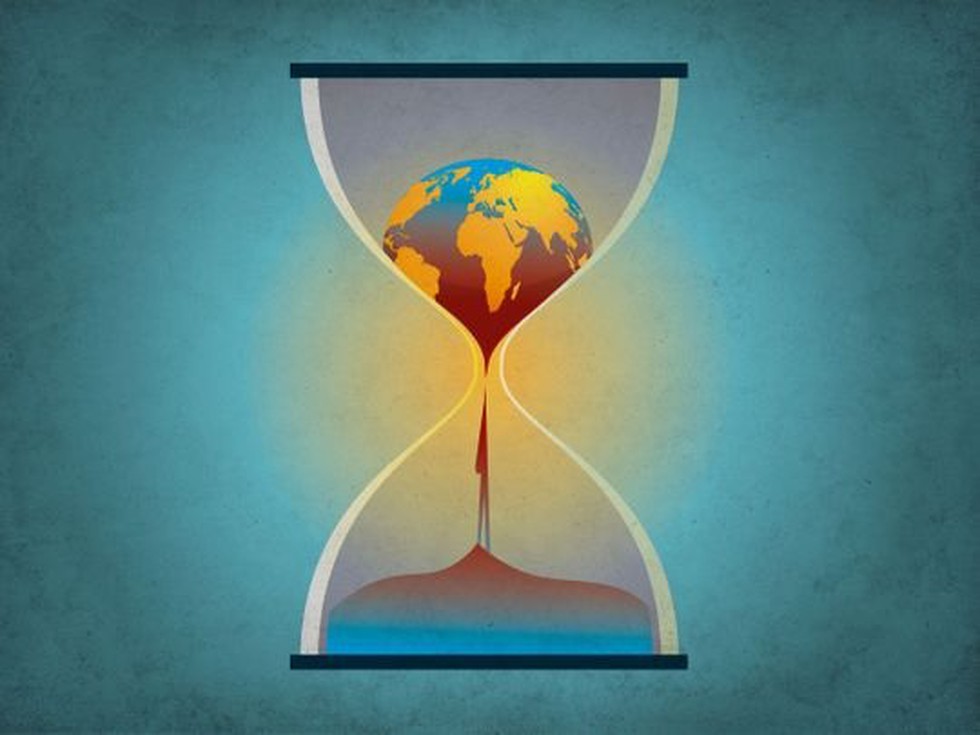
About:
- In 2019, the Oxford dictionaries declared “climate emergency” to be the word of the year, a word that reflects “the ethos, mood, or preoccupations of the passing year, and have lasting potential as a term of cultural significance”.
- It defines climate emergency as “a situation in which urgent action is required to reduce or halt climate change and avoid potentially irreversible environmental damage resulting from it”.
BRAIN FINGERPRINTING
The accused in Hathras rape case will undergo brain fingerprinting.
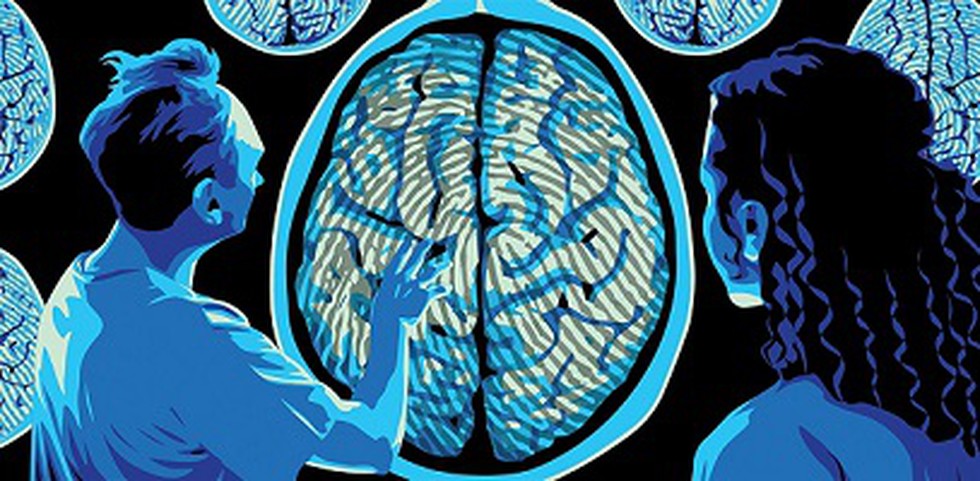
About:
- Brain Electrical Oscillation Signature Profiling (BEOSP) is also known as brain fingerprinting.
- It is a neuro psychological method of interrogation in which the accused’s participation in the crime is investigated by studying their brain’s response.
- The BEOSP test is carried out via a process known as electroencephalogram, conducted to study the electrical behaviour of the human brain.
- Under this test, the consent of the accused is first taken and they are then made to wear caps with dozens of electrodes attached to them.
- The accused are then shown visuals or played audio clips related to the crime to check if there is any triggering of neurons in their brains which then generate brainwaves. The test results are then studied to determine the participation of the accused in a crime.
BLUE TIDE
Over the last four days, visitors to beaches in Maharashtra have witnessed the spectacle of a fluorescent bluish glow when the waves hit the shoreline.
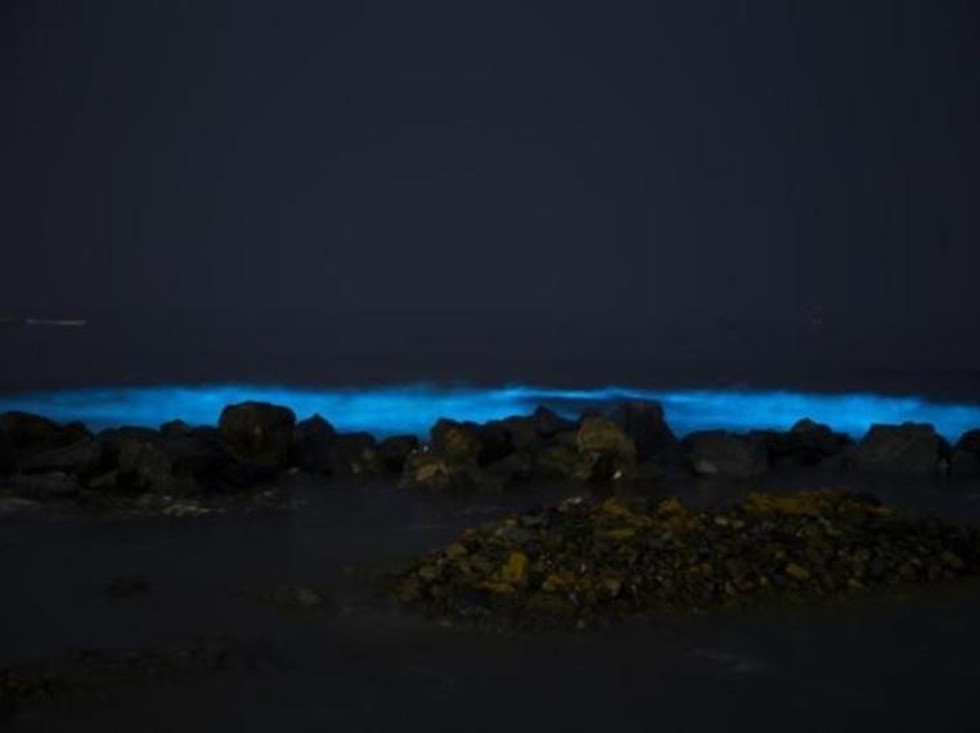
About:
- The phenomenon is called ‘blue tide’, and appears when luminescent marine life make the sea appear a deep shade of blue.
- The spectacle occurs when phytoplankton (microscopic marine plants), commonly known as dinoflagellates, produce light through chemical reactions in proteins. Waves disturb these unicellular microorganisms and make them release blue light.
Comments
Post a Comment